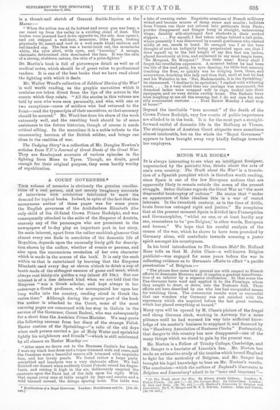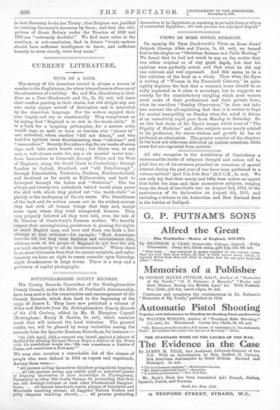MINOR WAR BOOKS.*
IT is always interesting to see what an intelligent foreigner, unperturbed by the patriotic bias, thinks about the acts of one's own country. The Truth about the War 1 is a transla-
tion of a Spanish pamphlet which is therefore worth reading, since Spain is one of the few European nations that are
apparently likely to remain outside the arena of the present struggle. Sefior °alien° regards the Great War as " the most disgraceful bankruptcy of culture." He states that " under an appearance of false idealism this is a war of vested interests. In the twentieth century, as in the time of Attila,
brute force has outraged right and justice." He complains that at the present moment Spain is divided into Francophilee and Germanophiles, "whilst no one, or at least hardly any one, remembers to be ' pro-Belgian,' in other words, European and human." We hope that his careful analysis of the causes of the war, which he shows to have been provoked by Germany alone, will contribute towards arousing a juster spirit amongst his countrymen.
In his brief introduction to The German Mole' Dr. Holland Rose tells us that M. Jules Class—a well-known Belgian publicist—was engaged for some years before the war in collecting evidence as to Germanic efforts to effect "a pacific penetration " of Belgium :—
" The phrase first came into general use with respect to French efforts to dominate Morocco, and it implies a gradual transforma- tion of an inferior by a superior civilization. In that sense the Pan-Germans have used and applied it to the Flemings, whom they sought to draw, or drive, into the Teutonic fold. Their efforts are here described by one who has had unequalled moans for watching them. The commercial results were so successful that one wonders why Germany was not satisfied with the supremacy which she acquired before the last groat venture, which has placed everything at hazard."
Many eyes will be opened by M. Claes's picture of the frugal and cheap German clerk, working in Antwerp for a mere
pittance until he had wormed his way into sufficient know- ledge of his master's business to supplant it, and financed by the " Hamburg Association of Business Clerks." Fortunately, that danger to this country has now disappeared—one of the many things which we stand to gain by the present war.
Mr. Norton is a Fellow of Trinity College, Cambridge, and Mr. Sanger is a barrister of Lincoln's Inn. Mr. Norton has made an exhaustive study of the treaties which bound England to fight for the neutrality of Belgium, and Mr. Sanger has brought his legal knowledge to bear on Mr. Norton's results. The conclusion—which the authors of England's Guarantee to Belgium and Luxemburgs admit to be "lame and impotent "—
• (1) The Truth about the War. By Alvaro Aleabt Gallen°. London : T. Fisher Unwin. [is. net.]— (2) The German Mote. By Jules Claes, London G. Bell and Sons. [2s. 6d. net.1—(3) Enulaud's Guarantee to Bolutunt and Luxemburg. By C. P. Sanger and H. T. 3. Norton. London : Allen and Unwin. [4a. ed. net.]
is that Germany broke her Treaty ; that Belgium was justified in resisting Germany's incursion by force; and that the obli- gations of Great Britain under the Treaties of 1839 and 1857 are "extremely doubtful." We find more value in the corollary, or sub-conclusion, that in future "treaty-makers should have sufficient intelligence to know, and sufficient honesty to state clearly, what they mean."

















































 Previous page
Previous page